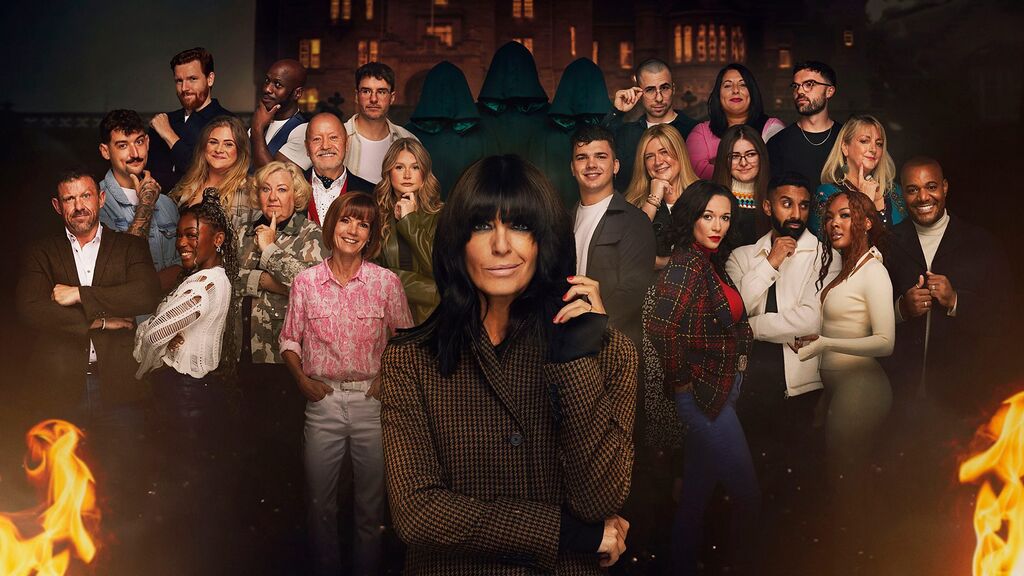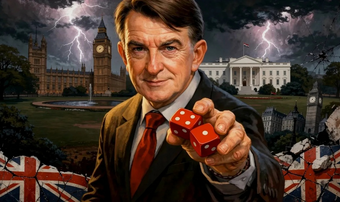Just a game? Here’s what the success of The Traitors reveals about our society…

It’s the TV show which has gripped the nation. In the CARE office, half of us are talking about it each morning. The other half are probably fed up with hearing about it.
The Traitors Series 2 is now averaging over 6 million viewers per episode, more than doubling the figures from the previous series. Indeed, my esteemed manager has become so hooked on it that he went back and watched all of Series 1 in the space of a week!
At CARE, our primary calling is within the field of politics, as we seek to work for God’s kingdom. But we do maintain an interest in the wider public square and in the cultural trends we observe within society: what is it that makes people think the way they think and act the way they act? By understanding the narratives people buy into and what makes them tick, we are more able to work with them (or indeed, oppose them).
The Traitors is, at its core, a very simple game, akin to the games of Mafia and Werewolves played by Christian Unions and Youth Groups across the country.
22 contestants enter a Scottish castle; 3 or 4 of them are secretly assigned to be Traitors at the beginning of the game; everyone else is a ‘Faithful’. Each night, they pick a fellow contestant to be ‘murdered’ and so, eliminated from the game. The following day, the group convenes to decide who they think is a Traitor, who is then ‘banished’ from the game. The group gradually gets smaller and smaller, and the question is: will the Faithful catch the Traitors before the Traitors get the Faithful?
So what is it that has so captured the nation’s imagination with The Traitors? And what lessons can we learn from observing it as a cultural phenomenon?
1. We enjoy using our minds (and admire others doing so!)
The Traitors may be a straightforward concept. But each episode is full of enough intrigue to give even Agatha Christie a headache.
Subplots and strategies abound; you might have worked out who the Traitor is, so you might want to vote them out. But what if you don’t think you would be able to convince enough others to vote them out? Well then, you might have to bide your time until you can persuade them. But then you might get murdered while you’re waiting. Confused yet…?
It’s a game full of moves and countermoves; the Traitors think they’re in control of the game (as they are the ones in the know), but it only takes one Faithful to have suspicions and the tables can turn very swiftly.
And it’s not just the contestants who have fun exercising their little grey cells. As viewers, we’re trying to work out what is going to happen next. Who would you murder, and why? What are the give-away tells which the Traitors have let slip? Who would you form an alliance with?
Indeed, the BBC have capitalised on this by launching their own ‘Traitors’ online game where you can vote for who you think will be the next person to be murdered, the next person to be banished, and who will win the game, providing strategists with rather too much time on their hands with the opportunity to map out every possible scenario from hereon in.
As humans, we enjoy using our minds, and we were made to use them: God gave them to us to be used! There is a reason why puzzles and crosswords are so popular; or why it’s a go-to for so many to watch a murder mystery on ITV in the evenings; or indeed, why strategy board games are so popular!
Of course we are to use our minds, as everything else, to worship God. When Jesus was asked what the greatest commandment was, he replied: “Love the Lord your God with all your heart and with all your soul and with all your mind and with all your strength” (Mark 12:30).
And we are made in God’s image (Genesis 1:27), that is, the image of the one who is ‘Immortal, Invisible, God only Wise.’ We, as humans, think, because we are made in the image of the great thinker!
And there are times when - when they are playing a great game and winning with their strategy - we actually admire the Traitors. For much of the current series, I’ve actually rooted for Harry to go undetected, because he’s been playing a blinder, in contrast to his compatriots! Cleverness and cunning and strategy are not inherently bad things, it depends on how one uses them: Jesus actually tells his disciples to be “as shrewd as serpents.”
2. We enjoy seeing the proud humbled
We love a good downfall, don’t we? Much of the narrative in the first three weeks of this season of The Traitors centred around the Traitor Paul. Paul - who may well be a lovely person in real life for all we know! - took it upon himself to play the role of pantomime villain.
By episode 3 he had already stabbed one of his fellow Traitors in the back. By episode 4, in a late pitch for this year’s Academy Awards, he cried crocodile tears about how he was ready to go home because he supposedly thought he was about to be murdered. On episode 7, he threw a second traitor under the bus, revelling in the plaudits from the Faithfuls and exalting in his own skill to the camera. Apparently (this is genuinely true!) to get himself into character, he spent his evenings reading American Psycho.
So it was amid much rejoicing when he was finally unmasked as a Traitor by episode 8. Even then, having been turned on by fellow traitor Harry, he told the cameras that Harry had learnt all he knew from him (er, I don’t think so, I think he knew what he was doing all along!), before exiting stage-right with a final pantomime bow.
The Faithfuls went wild, with chairs flying around the room, many expletives being uttered, and a general sense of joy and pandemonium as Claudia Winkleman looked on with the air of a Bond villain surveying her chaotic handiwork.
The room erupted…and so did Twitter. I actually predicted to my wife that one of the memes going round would be the one of England fans throwing their beers in the air to celebrate scoring in the European Championship final, and lo and behold, there it was, right at the top of my timeline!
As humans, we have an innate desire within us to see the proud being brought low. It doesn’t even have to be a Traitor; in Series 1, one of the most gripping episodes came when the contestant Tom, who was admittedly rather desperate at the time, claimed that as a magician he could ‘read people for a living’, and that another contestant had to be a Traitor. After persuading the whole room to back him, the contestant was voted out…only to reveal he had been faithful all along. Tom was promptly voted out the following day, to everyone’s amusement.
The desire to see the proud being humbled is built into the foundations of the universe. As Mary declares in her song, “[God] has performed mighty deeds with his arm; he has scattered those who are proud in their inmost thoughts. He has brought down rulers from their thrones but has lifted up the humble” (Luke 1:51-52). We have an innate longing for justice; we actively want to see those who are arrogant receive their just deserts.
3. We enjoy it because it’s not real
Some Christians will, for reasons of conscience, find a game show which features deception, treachery and backstabbing to be unpalatable. After all, in Philippians 4, Paul instructs us: “whatever is true, whatever is noble, whatever is right, whatever is pure, whatever is lovely, whatever is admirable—if anything is excellent or praiseworthy—think about such things.”
Whilst I fully respect my Christian brothers and sisters who take that approach, I don’t personally find my conscience pricked by The Traitors; it is, after all, a game akin to a murder mystery evening, rather than real life. All the participants enter it knowing that some of them will be lying; and that it’s their job to work out who it is, rather than being utterly blindsided.
Ultimately, the reason we enjoy the game is precisely because it is just that: a game. We know that in real life, deception and lies destroy lives.
The success of The Traitors doesn’t indicate that in real life, we’ve stopped caring about things like truth, loyalty or honour; far from it. Indeed, when the voters go to the polls this year in the next General Election, we’re likely to see that, as years of infighting by the Conservatives catches up with them. The very reason why - in some quarters - the likes of Boris Johnson attract such anger is because of their liberal relationship with truth. We care about these standards in our politics; and as in politics, so in life, whether it be in the workplace, the church or in family life. Humans, who are made in the image of a God who declares that he is the Truth, cannot stand lies.
Every now and again, one of the Traitors has a moment where they think beyond the game at hand, and they crumble under the weight of it. When the soldier Harry voted out fellow army veteran Jonny, he absolutely wept, and had to leave the room in tears. When Andrew pretended that he hadn’t called Harry ‘elusive’ in order to throw Ross under the bus, he said to camera afterwards: “it’s hard lying to be honest, bare-faced, blatant lying, especially when you know the other person is telling the truth…but I’m playing the game.”
Last season, when he was on the threshold of victory, Wilf (a Traitor) became more and more conflicted about whether he could go all the way to the end and claim the money (thereby depriving the Faithfuls of it). When he was eventually rumbled at the last moment, he said, amid tears, “I literally can’t put into words how happy I am at the moment. I’m so happy for you guys; I’ve found it really hard, and the more I’ve got to know you guys, the more I’ve had to try and steal money from you and it’s really hard…I tried to enjoy my time here, and the only way I could do that was by having people like you around me, knowing that if this time ever comes, at least the money is going to people who I really like.”
The reason we can watch something like the Traitors is because ultimately, really, we know that it is a game, and a gloriously hammy one at that.
‘Alex isn’t a traitor, she’s my girlfriend.’ Maddy Marple. ‘Parting gift.’ The fizzy rosé. ‘Paul just couldn’t be my son...but Ross is.’
It is just a game. And what a game it is.
Enjoy the final. And may the best man/woman win. (Jaz, I’m rooting for you…)






